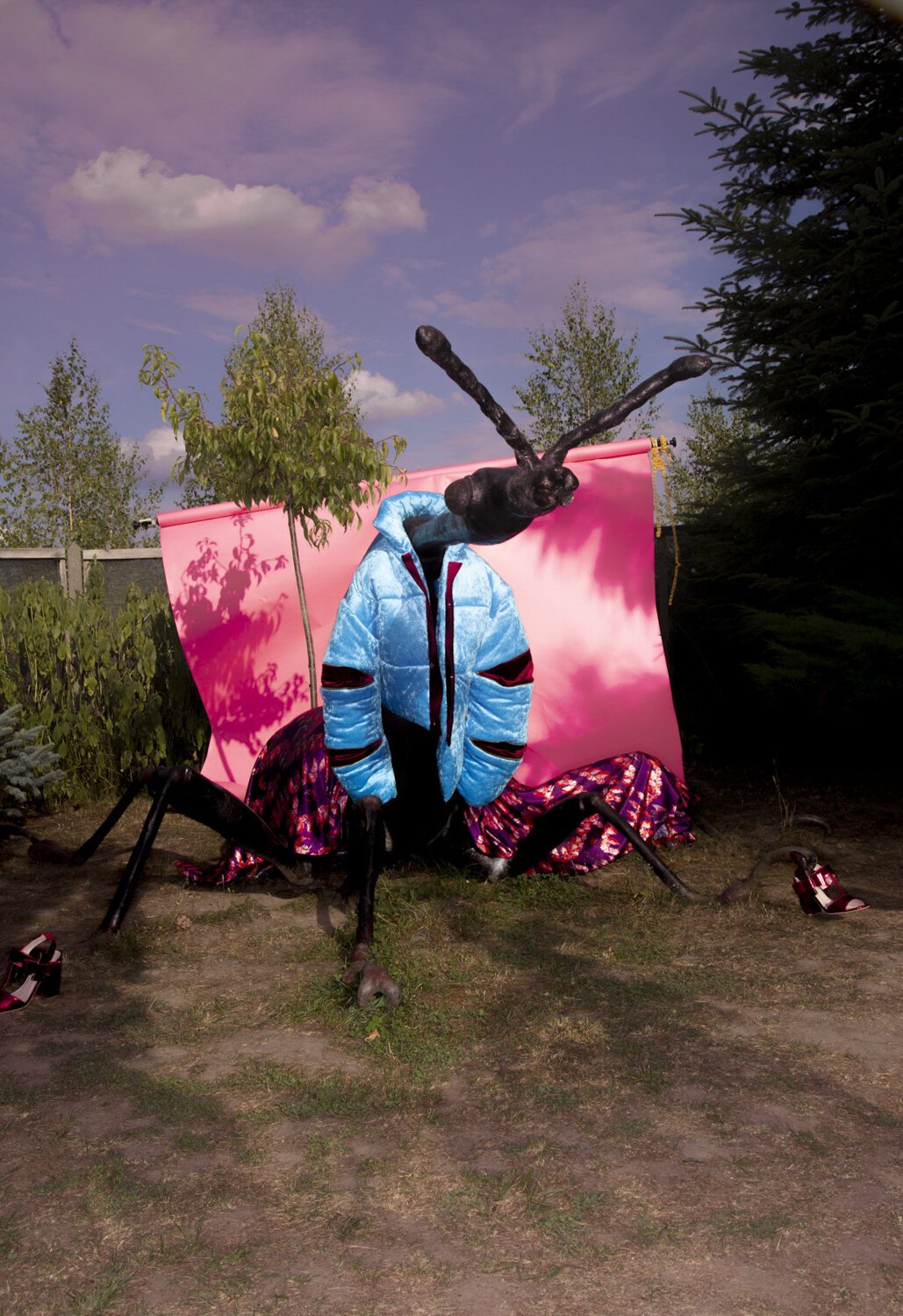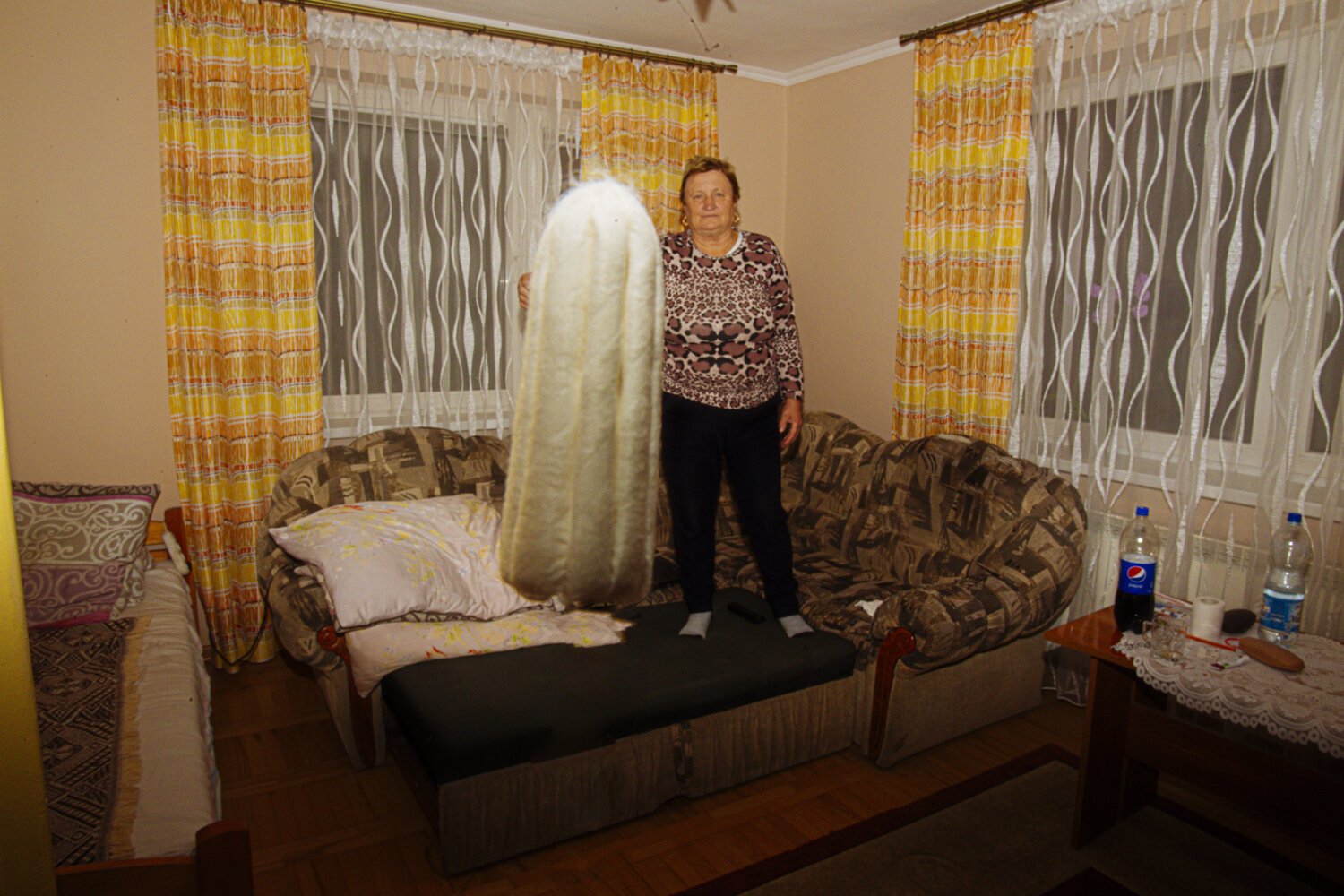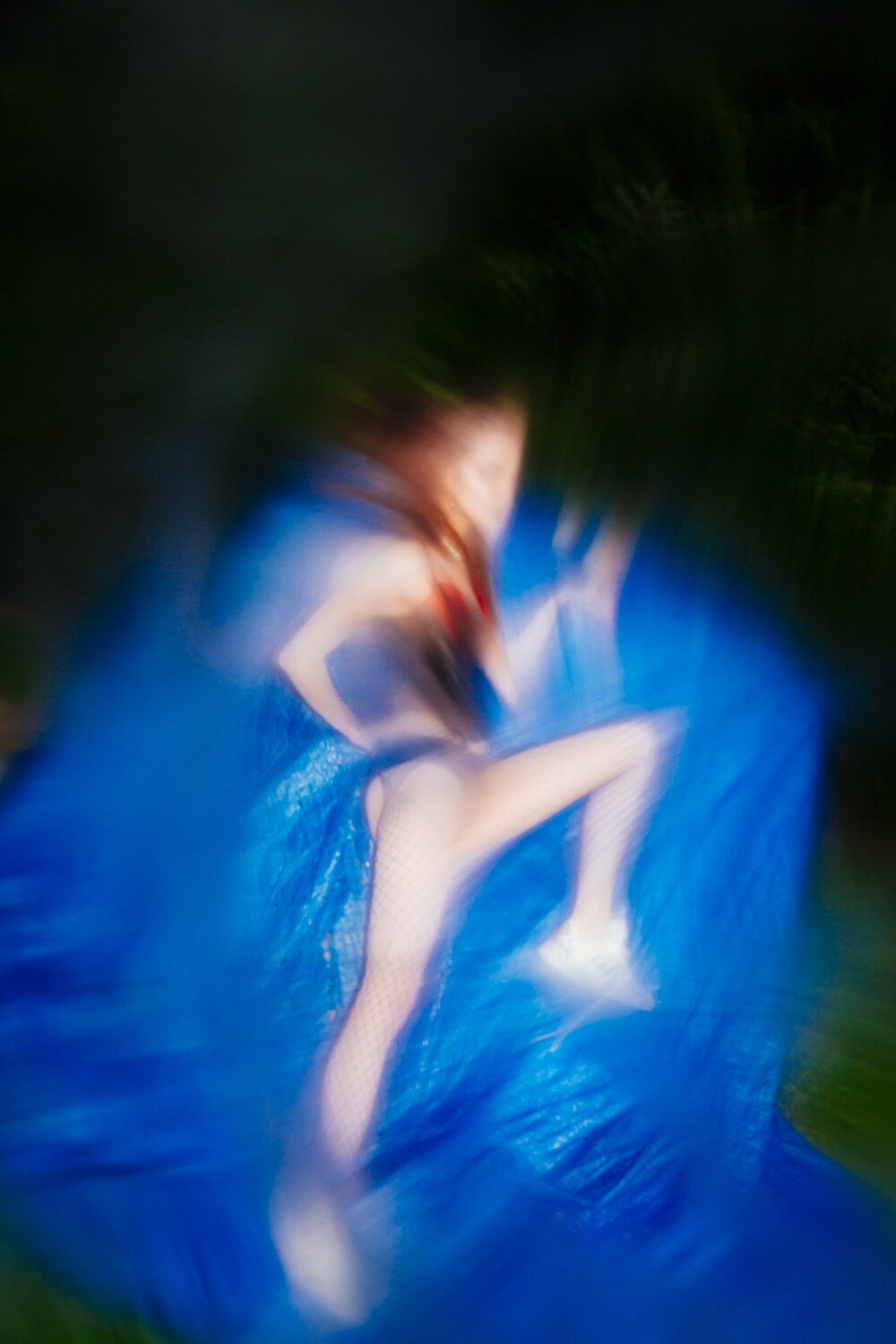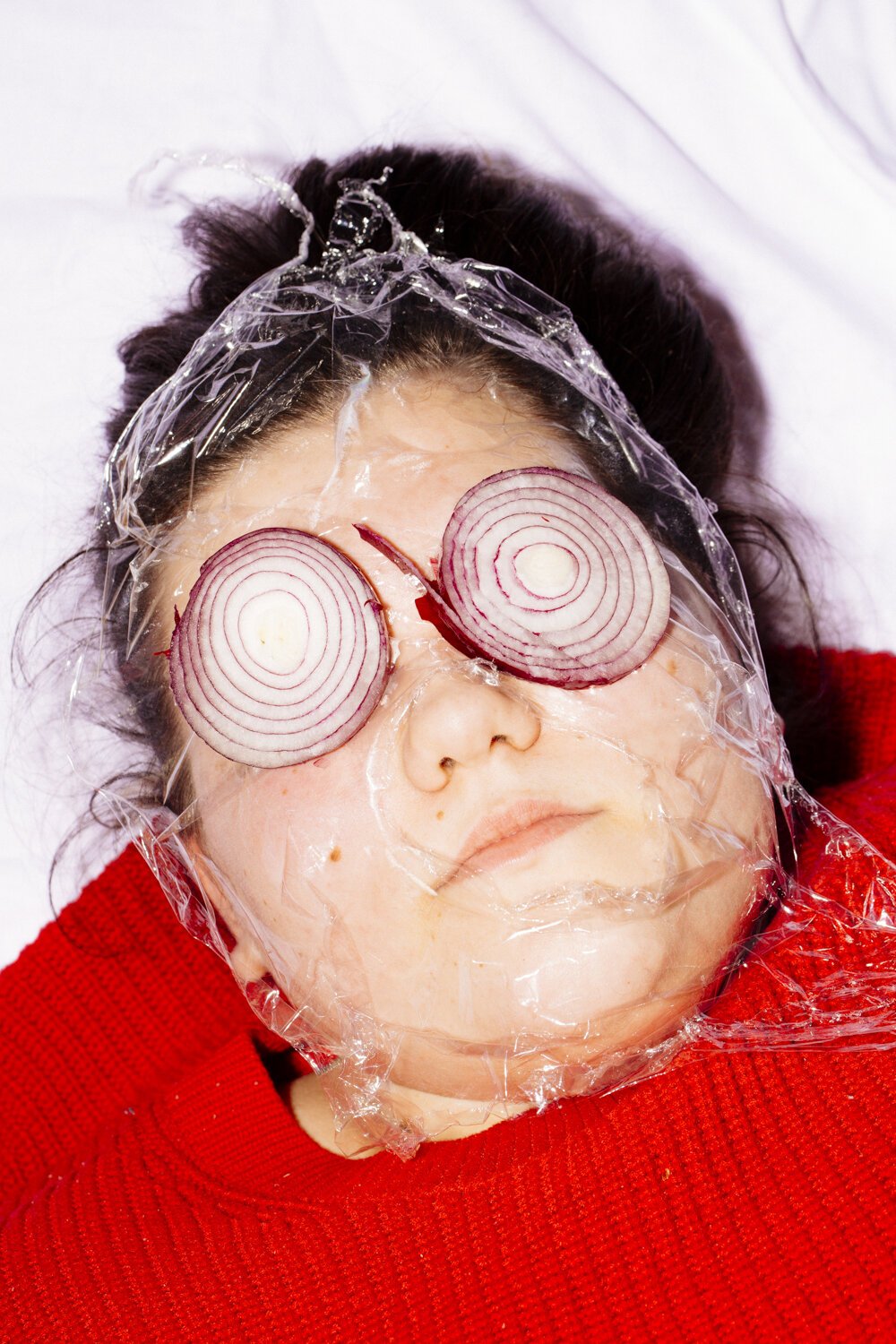Karolina Wojtas: Ugly Pretty
August 1st, 2020
Very few artists would describe their own images as “quite ugly”, but that it the joy in the work of award-winning photographer Karolina Wojtas. With no pretence at being simply aesthetically pleasing, her images instead come from a strange imaginative world of play and fun. With childish abandon she invites the audience into her surreal sense of humour, to revel in her kitsch off-centre aesthetic, and embrace the nonsensical. We reached out to Karolina to find out why she first picked up a camera, where inspiration strikes, and what makes her happy in her work.
POL: First off, can you tell us a little about what drew you to photography and how did you get your start?
KW: I have no idea, I've been doing it for what feels like a long time. But maybe it is about the speed, or the magic of using the flash… In the beginning I didn’t know how to use it, so I held it down with my finger, which resulted in mini explosion - that was quite intriguing…
Or maybe watching the family photos sessions, where most of the family members ending up having their heads cut off. I have no idea where it came from…
Photoblogs where becoming very popular and many of my friends needed pictures to share, so I took tones of sweet photographs of them in fields of wheat or corn. But over time I became a little bored with nice looking images, and I started to experiment with stranger ideas.
When I was in primary school, I watched some TV program about the Lodz Film School - and found out that you can study photography there. It become my dream. I decided to achieve this seemingly impossible goal! Although sometimes I wonder if it wasn’t the best idea.
“When I started study, I thought I needed professional people to work with, and I was scared. But I still had to do my homework and projects, so I had to ask my family to help and I realised it is the best option!”
POL: We’ve read previously that when you where first experiencing photography you where told that it wasn’t a career for a girl by your local photo society. Do you think this spurred you on to take it up as an art from? Would you say there is a sense of rebellion in your work? Is your photography political?
KW: I thought this idea was only a thing from my local town’s photo club, but I was met with the same pushback during an internship at a photographic studio. For some people girls can't be photographic assistants, we can't do serious work, we are only good at preparing coffee or cleaning.
Usually, I need to be mad about something to get stronger in my work. It can be anything. Sometimes work comes out of with fighting my camera, my own fears, or other strange ideas.
I wouldn't say I’m political, maybe on one or two projects I touch on this. But it’s mostly based on personal feelings, rather than about political changes. This crazy political world is not for me, I don’t like to argue about something we can’t change or really affect.
POL: Your photography could be described as a family affair - your friends, grandfather and brother have all participated in shoots (both in front of the lens and behind the scene). What drew you to working with people from your personal life in your work?
KW: I always dream about working with the best models, be in that professional world, but it was hard to achieve this and get into it. When I started I tried to find models, but mostly I couldn't!
When I started study, I thought I needed professional people to work with, and I was scared. But I still had to do my homework and projects, so I had to ask my family to help and I realised it is the best option!
With family or friends, we don’t have borders, I can ask them to everything, and moreover they have a lot of ideas! They are used to my concepts, and they don’t ask “why?”.
In the beginning, I did have feelings of shame but, hopefully, I realised that the most powerful thing is in family and friends! For example, my grandad is amazing. He knows everything is built and prepared! I always ask him to help, and he never refuses.
POL: Looking at your website, you clearly like a Gif and have described your images as “quite ugly”, what informs your aesthetic? Do you have any influences or artistic hero’s?
KW: I grew up at the time of first digital cameras becoming popular, and mostly these low-quality images affect me.
I still use my 14 years old camera, I have obsession and I still buying same kind (I have already got 17 copies of the same camera).
Mostly my heroes are amateur photographers. I am happy looking at these amateur images, made in situations that are quite difficult to explain, and I usually wonder why and how it could have happened. I like these photos so much, I can look at them with tears in my eyes, and wonder if it is possible to learn how to catch such unique stories.
But nowadays there is much less of that kind of photo, people know how to get a nice photo, they have a lot of filters, Instagram etc.
From the art field though, I love works Sarah Sze and Frederik Heyman.
POL: Can you talk us though your process a little bit? How do you find locations? Is every shoot an experimentation or do you have an idea of the end product you’re always working to?
KW: It depends on the situation, but if I am completely free I try to experiment.
Usually, I try to find a place to shoot and then we play just play like children; going through as many as possible stupid ideas and we just perform them.
I collect many strange hotels, parks and places that I am waiting for the right occasion to visit. In Poland, we have so manny kitchy places, and I love a totally tacky kind of style!
I don't like to see images immediately after shooting, because I had a different image in my imagination. Expectations vs. reality are mostly very different. But not worse, simply different. And usually, I need day rest to look at what I’ve taken in a new fresh way.
“I will set a still life. Then I am just waiting for something to fall or I destroy the set by kicking something, or the models will not pose, they’ll just be bored or angry. This way I achieve something that I completely could not predict. This is probably what interests me the most in photography.”
POL: For images which are clearly very constructed (there often appears to be an obvious element of set design and/or costuming) your work has a sense of spontaneity, as though each shot is quite candid. How to you create this sense of “accidental-ism” in your imagery?
KW: This is the result of documentation and situations created or combined with an accident. Usually, if I plan to take a picture, I will set a still life. Then I am just waiting for something to fall or I destroy the set by kicking something, or the models will not pose, they’ll just be bored or angry. This way I achieve something that I completely could not predict. This is probably what interests me the most in photography.
POL: If you where to describe your work in three words what would you pick?
KW: Play, Fun, Nonsense.
POL: You clearly have a sense of humour and fun, do you think this is something missing from popular photography?
KW: Maybe sometimes it's too serious, but on the other hand it’s good to have so many different types of imagination out there. Maybe it helps in a presentation way, to be more open? Photography sometimes can be something more than images hanging in frames on the wall.
POL: You display your photography in a very unique way, often creating immersive installations and asking the audience to interact with the pieces, how do you want people to react when they see your photography?
KW: I just play with it, people can like it or totally hate it.
I think I mix things from entertainment places, the circus, or a playground with the city’s daily market. I can’t predict the beehive, the only thing I can do is to prepare a nice playground for myself. If I like it maybe someone also will? But I have no idea what will happen. Always it is part of my imagination, but I am still scared of what others will think.
POL: Do you have a favourite project or artwork you’ve created? What makes that project special?
KW: No… Usually before the exhibition I like my ideas and I can’t wait to see it made real. But after it opens, I am destroyed and I want to change everything. And usually, I am doing that, the next exhibition is a new idea of presenting my work. But I like this changing system, always it’s something different.
“Expectations vs. reality are mostly very different. But not worse, simply different. And usually, I need day rest to look at what I’ve taken in a new fresh way.”
POL: You’re still so young, but you’ve shot a campaign for Marni, won multiple awards (including the Unseen Talent Award, 2019), have exhibited your work internationally and been profiled in magazines like Italian Vogue and The British Journal of Photography. Where do you want to see your photography take you in the next few years?
KW: Hmm, learn better English! And not to be scared with talking… it is the worst thing for me. I hope someday it will happen.
Of course, I have a lot of different dreams, but mostly I want to work and work, but in my own way. Turning playing into taking photos, creating more and more crazy ideas, and mixing up the medium.
But I will see what happens. In these strange times there are more important things: like having a simple life and joy in the sun or rain; or that my brother learned how to ride a bike! He is 11 years old! To me this is incredible and inspiration! We have so many adventures, last time when we went to ride a bike he fell down into huge mud puddle! and he was covered in smelly mud! He was so scared! It was a crazy trip!
POL: What are you working on right? What’s next?
KW: I am trying to prepare for two exhibitions. One is in my home town, based on story of a local photographer who would shoot photos of horses. So every citizen will be on a wooden horse. And then I will show my project about the education system Abzgram in Warsow.
And this is my last year in two universities and I need to finish my final project! It will be a lot to do! And I am terrified of how to prepare everything well!
About Karolina Wojtas
Karolina Wojtas (born in 1996) – is a photographer, currently studying in Film School Lodz and Institute of Creative Photography in the Czech Republic. She lives in a colourful world of experiment and endless fun.
Her award winning photography has garnered international acclaim, including: special mention at Plat(f)orm 2020, Fotomusuem Winterthur, Switzerland; in 2018 and 2019 receiving Scholarship of the Minister of Culture and National Heritage, Poland; winning the ING Unseen Talent Award, 2019, Amsterdam, Holland; winning Tiff Open 2018, at Tiff Festival Wrocław; and winning ShowOFF, Kraków Photo Month, 2017.
Solo exhibitions include: Gatunek: brat. Jak unicestwić?, Gallery Naga, Warszawa, 2020; Abzgram, Galeria F7, Slovakia, during Bratislava Month of Photography, 2019; Extremely rich fauna of the local area, FotoArtFestival in Bielsko-Biała, 2019; and two solo shows at the Museum in Pełkinie in 2019.
Alongside this her work has appeared in many intentional publications including: The British Journal of Photography, Lampoon Magazine, L’uomo Vogue, Superpaper, Tampon - Ordinary Magazine, Causette, and Das Magazin Switzerland.


















